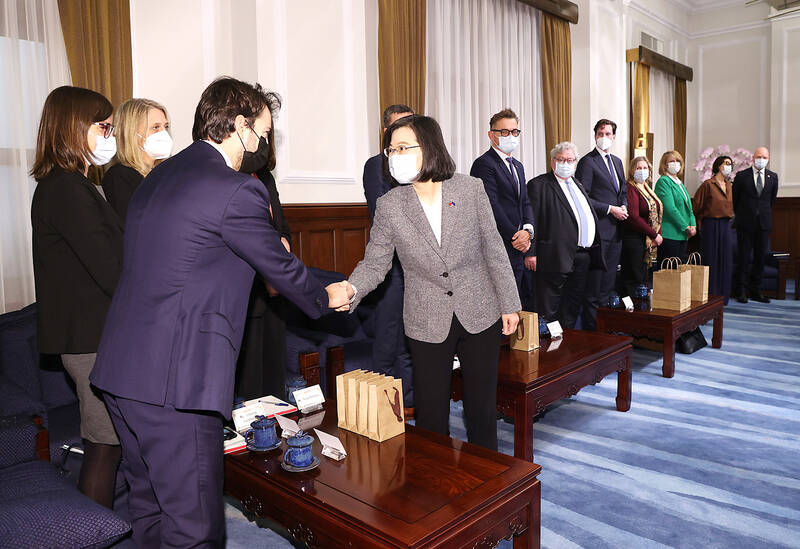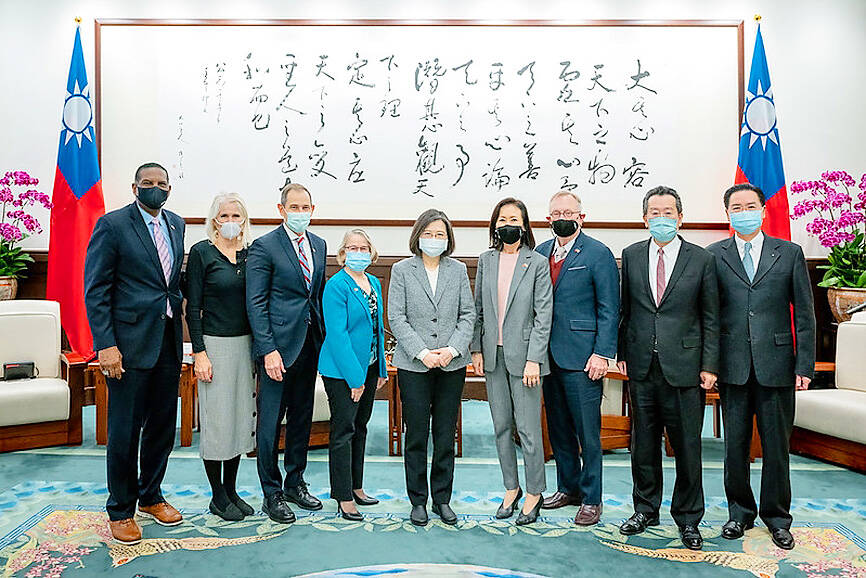Steps should be taken toward establishing a bilateral investment agreement between the EU and Taiwan, European Member of Parliament Anna-Michelle Asimakopoulou said in Taipei yesterday.
Asimakopoulou, a Greek politician who is vice chair of the parliament’s International Trade Committee, is part of a delegation that met with President Tsai Ing-wen (蔡英文) at the Presidential Office.
The EU recognizes its trade and investment partnership with Taiwan as a “strategic relationship with geopolitical implications,” Asimakopoulou said.

Photo: CNA
Further bilateral cooperation on global supply chains would be mutually beneficial in light of the leading role that Taiwan plays with respect to semiconductors, she said.
Given the circumstances, the European Parliament calls on the EU to launch “an impact assessment, a public consultation and a scoping exercise” related to a bilateral investment agreement with Taiwan, she said.
Those assessments and consultations are part of the preparations needed before the two sides can officially begin negotiations on the issue.

Photo courtesy of the Presidential Office
Taiwan and the EU are like-minded partners, with their friendship built on the common values of democracy, rule of law and respect for human rights, she said.
It is in that spirit that the delegation expresses its gratitude to Taiwan for being “on the right side of history” in supporting the EU’s efforts to help Ukraine defend itself in response to “the unconscionable war of [Russian President Vladimir] Putin,” Asimakopoulou said.
She also praised Taiwan for its “measured and responsible reaction to unprovoked and increasing aggression and provocation from China,” referring to military drills launched by Beijing after US House of Representatives Speaker Nancy Pelosi visited Taiwan in early August.
Asimakopoulou reiterated the EU’s stance that even though it diplomatically recognizes Beijing and not Taipei, it believes the “status quo” in the Taiwan Strait “cannot be changed unilaterally,” as it opposes “the use or threat of force or economic coercion against Taiwan from China.”
Tsai earlier welcomed the delegation, the first official visit to Taiwan by a delegation representing the trade committee.
She also thanked the European Parliament and its committees for this year passing more than 10 resolutions in support of Taiwan, including measures backing the nation’s international participation, and calling for peace and security across the Taiwan Strait.
The 13-member delegation also met with Premier Su Tseng-chang (蘇貞昌) and other senior officials from the National Development Council, the Ministry of Economic Affairs, the Office of Trade Negotiations and the Ministry of Foreign Affairs during their stay, which began Sunday and ends today.
Also yesterday, Tsai welcomed a group of visiting US lawmakers at the Presidential Office.
The all-Republican group led by US Representative John Curtis and including US representatives Mariannette Miller-Meeks, Burgess Owens and Michelle Steel is in Taiwan from Saturday through tomorrow.
The US group’s visit means that 36 US representatives and senators have visited Taiwan this year, reflecting strong bipartisan support for Taiwan, the foreign ministry said.
During their meeting with Tsai, Curtis, who lived in Taiwan in 1979 and 1980 as a missionary, told the president that he has since then witnessed Taiwan’s dramatic change into a vibrant democracy.
“I arrived just after the end of the defense treaty and the switch of diplomatic recognition [Washington recognizing Beijing] and the passage of the Taiwan Relations Act,” he said.
He said that although it was a difficult time for Taiwan, he appreciated how warmly he was welcomed by the people of Taichung, Miaoli County and Taipei’s Neihu District (內湖), places he lived at the time.
The delegation’s visit was to be a testament to the US Congress’ strong support for Taiwan, Curtis said.

PREPAREDNESS: Given the difficulty of importing ammunition during wartime, the Ministry of National Defense said it would prioritize ‘coproduction’ partnerships A newly formed unit of the Marine Corps tasked with land-based security operations has recently replaced its aging, domestically produced rifles with more advanced, US-made M4A1 rifles, a source said yesterday. The unnamed source familiar with the matter said the First Security Battalion of the Marine Corps’ Air Defense and Base Guard Group has replaced its older T65K2 rifles, which have been in service since the late 1980s, with the newly received M4A1s. The source did not say exactly when the upgrade took place or how many M4A1s were issued to the battalion. The confirmation came after Chinese-language media reported

A Ministry of Foreign Affairs official yesterday said that a delegation that visited China for an APEC meeting did not receive any kind of treatment that downgraded Taiwan’s sovereignty. Department of International Organizations Director-General Jonathan Sun (孫儉元) said that he and a group of ministry officials visited Shenzhen, China, to attend the APEC Informal Senior Officials’ Meeting last month. The trip went “smoothly and safely” for all Taiwanese delegates, as the Chinese side arranged the trip in accordance with long-standing practices, Sun said at the ministry’s weekly briefing. The Taiwanese group did not encounter any political suppression, he said. Sun made the remarks when

The Taiwanese passport ranked 33rd in a global listing of passports by convenience this month, rising three places from last month’s ranking, but matching its position in January last year. The Henley Passport Index, an international ranking of passports by the number of designations its holder can travel to without a visa, showed that the Taiwan passport enables holders to travel to 139 countries and territories without a visa. Singapore’s passport was ranked the most powerful with visa-free access to 192 destinations out of 227, according to the index published on Tuesday by UK-based migration investment consultancy firm Henley and Partners. Japan’s and

BROAD AGREEMENT: The two are nearing a trade deal to reduce Taiwan’s tariff to 15% and a commitment for TSMC to build five more fabs, a ‘New York Times’ report said Taiwan and the US have reached a broad consensus on a trade deal, the Executive Yuan’s Office of Trade Negotiations said yesterday, after a report said that Washington is set to reduce Taiwan’s tariff rate to 15 percent. The New York Times on Monday reported that the two nations are nearing a trade deal to reduce Taiwan’s tariff rate to 15 percent and commit Taiwan Semiconductor Manufacturing Co (TSMC, 台積電) to building at least five more facilities in the US. “The agreement, which has been under negotiation for months, is being legally scrubbed and could be announced this month,” the paper said,